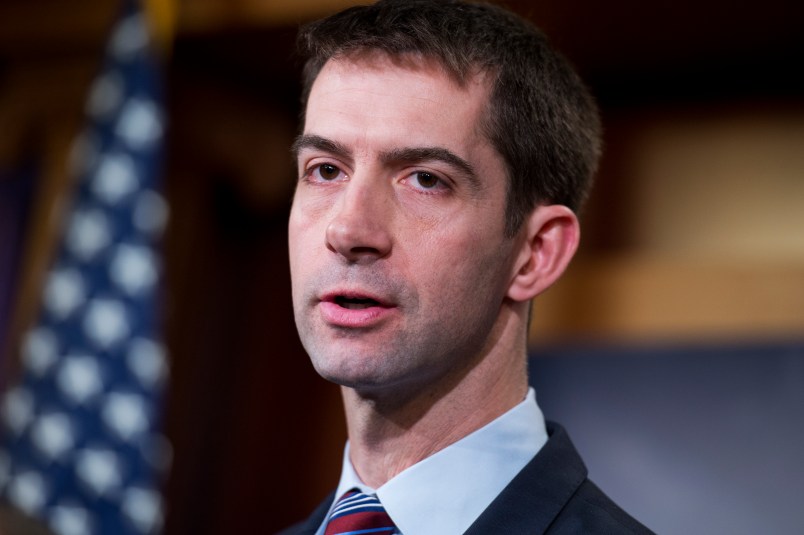WASHINGTON — Forty-seven Republican senators signed an open letter to Iran’s leaders warning that a potential nuclear deal won’t outlast Barack Obama’s presidency, hinting that Congress does not intend to honor it.
The letter, led by freshman Sen. Tom Cotton (R-AR) and first reported by Bloomberg View, comes at a highly sensitive time as the Obama administration is reportedly closing in on an agreement to lift economic sanctions on Iran in exchange for halting its nuclear program for as many as 15 years.
“It has come to our attention while observing your nuclear negotiations with our government that you may not fully understand our constitutional system,” the Republican senators wrote. “First, under our Constitution, while the president negotiates international agreements, Congress plays the significant role of ratifying them. In the case of a treaty, the Senate must ratify it by a two-thirds vote. … Anything not approved by Congress is a mere executive agreement.”
(The senators erred in their description of how treaties work. As Harvard professor Jack Goldsmith pointed out, the Senate does play a key role in voting on and consenting to a treaty, but it is the president who negotiates and formally “ratifies” it, as the Congressional Research Service has explained.)
“President Obama will leave office in January 2017,” they continued, adding that they “will consider any agreement regarding your nuclear-weapons program that is not approved by the Congress as nothing more than an executive agreement between President Obama and Ayatollah Khamenei. The next president could revoke such an executive agreement with the stroke of a pen and future Congresses could modify the terms of the agreement at any time.”
The signatories to the letter include three potential Republican presidential candidates — Sens. Rand Paul (KY), Ted Cruz (TX) and Marco Rubio (FL) — and Senate Majority Leader Mitch McConnell (KY).
Senate Minority Leader Harry Reid (D-NV) attacked the Republican letter as a “juvenile political attack” aimed at “undermining our commander in chief.” Republicans, he said, “cannot accept the fact that this good man, Barack Obama, this man with the unusual name, was elected twice by overwhelming margins by the people of this country.”
In Senate floor remarks, he said Democrats never contemplated sending a letter to Iraq’s leaders highlighting their disagreements with President George W. Bush. “So I say to my Republican colleagues: Do you so dislike President Obama you would take this extroardinary step? Obviously so,” he said. “Why was it taken? I really don’t understand other than the dislike of the president.”
Senate Minority Whip Dick Durbin (D-IL), a close Obama ally, excoriated Republicans on Monday, calling the letter a “political stunt” that could lead to another Middle East war.
“This is a cynical effort by Republican Senators to undermine sensitive international negotiations—it weakens America’s hand and highlights our political divisions to the rest of the world,” he said in a statement. “Understand that if these negotiations fail, a military response to Iran developing their nuclear capability becomes more likely. These Republican Senators should think twice about whether their political stunt is worth the threat of another war in the Middle East.”
This article has been updated.







Can anyone imagine what would have happened if all Democratic Senators had sent a letter to Saddam Hussein telling them they wouldn’t go to war over Bush’s bullshit claim of WMD, no matter what the President ordered the country to do? Maybe that’s not a perfect example, but I’m blown away by the brazen disregard and disrespect they’ve given the President in this matter.
This letter is tantamount to treason in my opinion.
Was waiting to see how long someone at TPM got around to this as a front page story today. This is un-fucking-believable. Never in all my years have I seen an opposition party try to run roughshod over a President conducting foreign policy who’s working as the nation’s Commander in Chief, like this Congress has.
Being that the GOP will not hold the White House for the foreseeable future how is it that what they say is even worth the paper it’s written on?
Ten years ago, these same people were crying “traitor!” to those that disagreed with then-President Bush. Now they openly undermine the sitting president and the media can’t remember past yesterday.
Agreed. How is this not treason?
So the GOP are explicitly undermining Executive Branch authority and traditions regarding who sets foreign policy in the United States and violating the Logan Act.
Way to go you anti-America fucksticks known as the GOP.